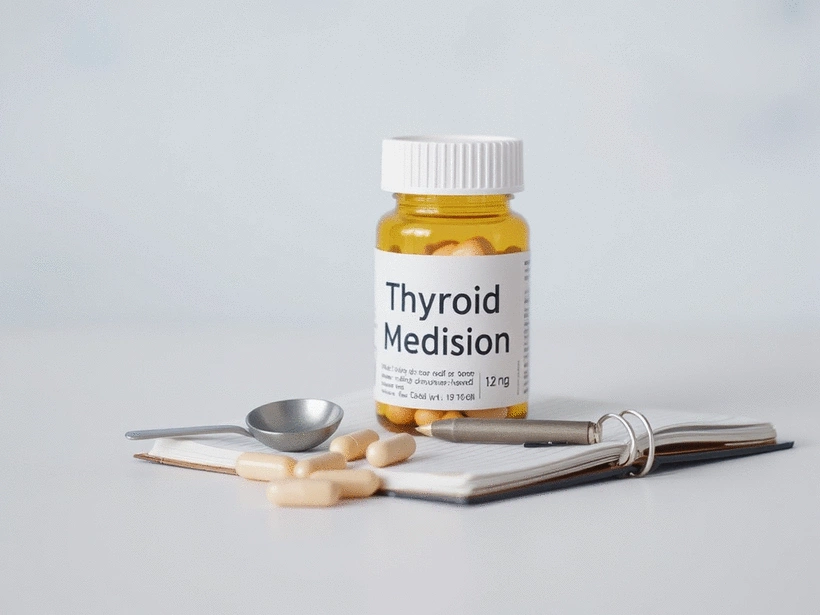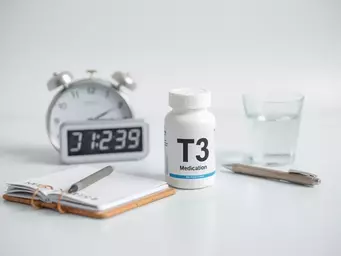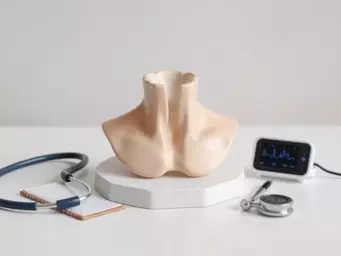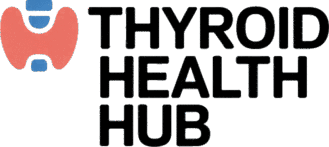Finding Your Ideal Thyroid Dose

What if the key to feeling your best lies in understanding how your thyroid medication dosage impacts your daily life? With the right insights, you can make informed decisions that enhance your overall well-being.
What You Will Learn
- Thyroid medication dosage is crucial for managing hypothyroidism and must be tailored to individual needs.
- Proper dosage helps maintain optimal energy levels, weight management, mood stability, and overall metabolic health.
- Continuous monitoring of symptoms and communication with healthcare providers are essential for effective treatment.
- Utilizing thyroid function tests, such as Free T4 and Free T3, provides insights into how well your medication is working.
- Interactive tools and patient forums can enhance understanding and provide support throughout your thyroid health journey.
Key Aspects of Thyroid Treatment Monitoring
Maintaining optimal thyroid function requires continuous monitoring and a proactive approach. The visual below highlights the crucial elements involved in evaluating and managing your thyroid treatment effectively.
Identify Symptom Changes
- Energy levels
- Weight fluctuations
- Mood/anxiety
Collaborate with Providers
- Regular check-ups
- Honest communication
- Clarify medical jargon
Utilize Function Tests
- Free T4 (thyroxine)
- Free T3 (active hormone)
- Regular testing
Empower Self-Monitoring
- Symptom diary
- Medication reminders
- Mood/energy check-ins
Understanding Thyroid Medication Dosage for Optimal Function
When it comes to managing hypothyroidism, understanding thyroid medication dosage is crucial. Thyroid medications help restore balance to your hormone levels, ensuring your body functions properly. But why does dosage matter so much? Even a slight adjustment can significantly impact how you feel daily. In this section, we’ll explore the importance of thyroid medication, what it consists of, and how getting the dosage right can lead to a healthier you!

Dosage isn't just a number; it's tailored to your unique needs. Every patient responds differently to medication, which is why working closely with your healthcare provider is essential. It's all about finding the sweet spot for your body’s hormonal needs!
What is Thyroid Medication and Why is Dosage Important?
Thyroid medication primarily aims to replace or supplement the hormones that your thyroid gland isn't producing adequately. This is particularly important for those diagnosed with hypothyroidism. The right dosage ensures your metabolism, energy levels, and overall health are maintained efficiently. The key lies in understanding that every individual's requirement is different.
- Helps maintain optimal energy levels
- Affects weight management
- Supports mood stability and cognitive function
- Essential for overall metabolic health
Getting the dosage right can mean the difference between thriving and merely surviving. It’s not just about taking a pill; it’s about enhancing your quality of life!
The Role of Thyroid Hormones in the Body
Your thyroid produces hormones, primarily thyroxine (T4) and triiodothyronine (T3), which play pivotal roles in numerous bodily functions. These hormones influence your metabolism, regulate your heart rate, and even affect your temperature regulation. When your thyroid is underactive, like in hypothyroidism, everything from your energy levels to your mood can be impacted.
In fact, imbalanced thyroid hormones can lead to symptoms such as fatigue, weight gain, and depression. This is why understanding your thyroid health and how it interacts with medication is vital for you to feel your best!
Overview of Common Thyroid Medications: Levothyroxine, Synthroid, and Liothyronine
Several medications are available to manage thyroid conditions effectively. The most common ones include:
- Levothyroxine: A synthetic form of T4, it’s the most commonly prescribed medication for hypothyroidism. For more details on its uses and precautions, you can consult resources like the Mayo Clinic's guide on Levothyroxine.
- Synthroid: A brand name for levothyroxine, it's designed for consistent absorption and effectiveness.
- Liothyronine: A synthetic form of T3, used in specific cases where patients need a more rapid increase in hormone levels.
It's essential to discuss these options with your doctor, as they can evaluate which medication and dosage work best for you. Remember, taking charge of your thyroid health starts with the right information and guidance!
Pro Tip
Did you know that keeping a detailed symptom journal can significantly enhance your discussions with your healthcare provider? Tracking fluctuations in your energy levels, mood, and any side effects can help identify patterns that inform dosage adjustments. This proactive approach not only empowers you but also aids your healthcare team in tailoring your treatment more effectively!
Evaluating Your Thyroid Treatment: The Importance of Continuous Monitoring
When it comes to managing thyroid health, understanding how to evaluate your treatment is vital. Continuous monitoring ensures that your thyroid medication is working effectively. Have you ever wondered if your symptoms have changed, or if you need to adjust your dosage? Identifying these changes is key to maintaining optimal thyroid function!
One of the first steps in this evaluation is to pay attention to your body's signals. Symptoms such as fatigue, weight changes, and mood swings can indicate that your dosage needs adjustment. Monitoring these signs regularly can empower you to take charge of your health.

How to Identify Changes in Symptoms That May Require Dose Adjustments
- Notice fluctuations in energy levels
- Keep track of weight changes
- Watch for new or worsening symptoms like depression or anxiety
By staying vigilant about these aspects, you can better understand your body's response to thyroid medication. It's always best to keep a journal of your symptoms, providing you with a clearer picture when discussing your health with your provider.
Collaborating with Healthcare Providers: Essential Communication Tips
Effective communication with your healthcare provider is crucial for optimal thyroid management. Don't hesitate to ask questions! Make sure you feel comfortable discussing any changes in your health with them. An open dialogue can significantly enhance your treatment journey.
- Schedule regular check-ups
- Be honest about your symptoms and any lifestyle changes
- Request clarification on any medical jargon you don’t understand
By fostering a strong partnership with your healthcare team, you're setting yourself up for success in managing your thyroid health!
Utilizing Thyroid Function Tests: Free T4 and Free T3 Insights
Thyroid function tests are essential tools in monitoring your thyroid health. These tests measure levels of Free T4 and Free T3, which are crucial in understanding your thyroid hormone status. It’s important to remember that optimal levels can vary from person to person.
- Free T4: Measures the level of thyroxine in your blood
- Free T3: Assesses the active form of thyroid hormone
Regular testing can provide invaluable insights into how well your medication is working and whether any adjustments are necessary!
Empowering Your Thyroid Health Journey
At Thyroid Health Hub, we believe that taking an active role in your health journey is paramount. Empowering yourself with the right tools can lead to better outcomes. Have you explored interactive tools and resources available to help you manage your thyroid treatment more effectively?
Using Interactive Tools: Calculators and Visual Aids for Dosing
Interactive tools can simplify complex information and help you make informed decisions about your medication. Consider utilizing:
- Dosage calculators specific to thyroid medication
- Visual aids that outline symptoms and possible actions
- Mobile apps to track your medication and appointments
These tools can serve as helpful companions on your path to managing hypothyroidism.
Encouraging Patient Self-Monitoring for Improved Outcomes
Self-monitoring is an excellent way to stay engaged with your treatment. Taking time to assess your symptoms and medication adherence can yield significant benefits. Have you thought about creating a daily routine for tracking your thyroid health?
- Keep a symptom diary
- Set reminders for medication times
- Regularly check in with yourself about mood and energy levels
Remember, you are your best advocate! Your engagement plays a vital role in achieving the best possible outcomes.
Engaging with Patient Forums for Shared Experiences and Advice
Connecting with others can be incredibly beneficial. Engaging in patient forums allows you to share experiences, find support, and learn from others who are navigating similar challenges. Have you considered joining a local or online support group?
- Gain insights from those who understand your journey
- Share tips and strategies that have helped others
- Build a community that supports your health goals
Being part of such a community can make a significant difference in your journey with hypothyroidism!
Next Steps for Optimal Thyroid Function
As you continue to navigate your thyroid health journey, having a solid plan in place for ongoing monitoring is essential. What steps can you take today to ensure your thyroid function remains optimal?
Setting Up an Ongoing Monitoring Plan with Your Healthcare Provider
Establishing a clear monitoring plan with your healthcare provider is fundamental. Regular follow-ups will help ensure that your treatment remains effective. Together, you can create a schedule that best fits your needs.
- Determine frequency of blood tests
- Schedule appointments based on your treatment plan
- Discuss any upcoming lifestyle changes that may impact your health
This proactive approach empowers you to stay on top of your thyroid health!
Sharing Your Experience: How to Engage with Support Communities
Sharing your own experiences not only helps you process your journey but also aids others facing similar challenges. Consider writing about your thyroid health journey on social media or in support groups.
- Offer tips that have worked for you
- Encourage others to share their stories
- Build connections with those who resonate with your experiences
Your voice can be a powerful asset in building a supportive thyroid community!
Exploring Telemedicine Options for Ongoing Thyroid Care
In today's digital world, telemedicine has become a vital tool for managing chronic conditions like hypothyroidism. It allows for greater flexibility and convenience in accessing care. Have you explored how telehealth can benefit your monitoring plan?
- Schedule virtual consultations with your healthcare provider
- Utilize online platforms for medication refills
- Access educational resources and support groups online
Telemedicine can enhance your ability to manage your thyroid health from the comfort of your home.
Recap of Key Points
Here is a quick recap of the important points discussed in the article:
- Thyroid medication dosage is tailored to individual needs and is crucial for managing hypothyroidism.
- Regular monitoring of symptoms and thyroid function tests can help in adjusting medication effectively.
- Effective communication with healthcare providers enhances treatment outcomes and fosters a supportive healthcare relationship.
- Utilizing interactive tools and self-monitoring strategies can empower patients to take charge of their thyroid health.
- Engaging with patient forums and communities can provide valuable support and shared experiences.
Frequently Asked Questions About Thyroid Medication and Dosage
Q1: Why is thyroid medication dosage so important?
A1: Thyroid medication dosage is crucial because it helps to restore balance to your hormone levels, essential for proper body function. The correct dosage ensures your metabolism, energy levels, and overall health are maintained efficiently. Even small adjustments can significantly impact your daily well-being, as individual needs vary greatly.
Q2: What are the main types of thyroid medications?
A2: The most common thyroid medications include Levothyroxine (a synthetic form of T4), Synthroid (a brand name for levothyroxine), and Liothyronine (a synthetic form of T3). Your doctor will determine which medication and dosage are best suited for your specific condition.
Q3: How do I know if my thyroid medication dosage needs to be adjusted?
A3: Changes in symptoms like fluctuations in energy levels, weight changes, mood swings, depression, or anxiety can indicate a need for dosage adjustment. It's important to monitor these signs and discuss them with your healthcare provider. Keeping a symptom journal can also be very helpful.
Q4: What role do Free T4 and Free T3 tests play in monitoring thyroid treatment?
A4: Free T4 and Free T3 tests are essential thyroid function tests that measure the levels of thyroxine and the active form of thyroid hormone in your blood, respectively. These tests provide invaluable insights into how well your medication is working and if any adjustments are necessary to achieve optimal hormone levels.
Q5: How can interactive tools and patient forums help with managing thyroid health?
A5: Interactive tools such as dosage calculators, visual aids, and mobile apps can simplify complex information and help you track your medication and appointments. Patient forums offer a community where you can share experiences, receive support, and learn tips and strategies from others navigating similar challenges, making a significant difference in your journey with hypothyroidism.









